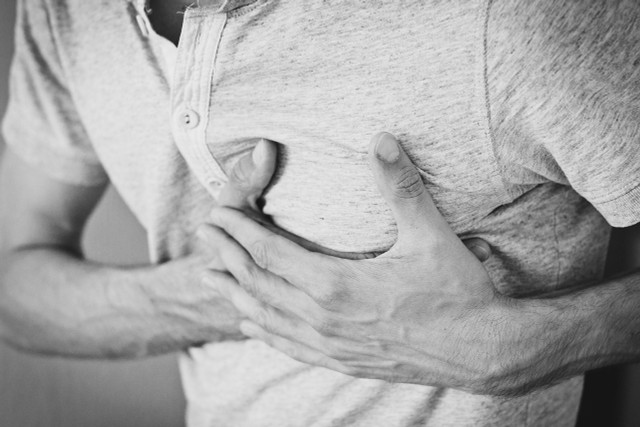
There are many steps you can take to prevent a heart attack. In this article you will find tips to help keep your heart healthy for the long term.
What diseases are Germans afraid of? According to a survey by Forsa on behalf of DAK-Gesundheit, the greatest health-related fears are suffering from cancer, dementia or a stroke. The fear of a heart attack only makes it to number five. And that despite the fact that cardiovascular diseases such as a heart attack have been the number one cause of death in Germany for years.
In everyday life there are some factors that increase the risk of a heart attack. You can actively reduce many of them if you want to prevent a heart attack.
Risk factors for a heart attack
It is often bad habits that unnecessarily increase the risk of a heart attack. If you’re willing to ditch them and adopt new healthy routines, it can help keep your heart healthy and prevent heart attacks.
These are some of the risk factors for a heart attack:
-
Obesity: According to the World Health Organization (WHO), obesity now kills more people than underweight. Obesity can often be associated with high blood pressure, high blood fat and high blood sugar levels. These four symptoms together form the “metabolic syndrome”, which can have serious consequences for the heart and circulation.
-
Smoking: Cigarette smoke increases the concentration of “bad” cholesterol (LDL cholesterol) in the blood, while at the same time the proportion of good cholesterol (HDL cholesterol) decreases. LDL cholesterol levels are directly linked to heart attack risk.
-
Alcohol: Regular alcohol consumption can lead to many cardiovascular diseases, including atrial fibrillation and high blood pressure.
-
Wrong diet: Eating a lot of trans fatty acids increases the “bad” cholesterol, which can accumulate in the blood vessels and promote arteriosclerosis. This disease is the main cause of cardiovascular disease. Trans fats are found, for example, in fried, roasted or baked foods (donuts, croissants, biscuits, chips, fries) and ready meals such as frozen pizza.
-
Lack of exercise: Those who do not exercise enough have a greater risk of heart attack. For women over the age of 30, lack of exercise is actually the most important risk factor.
Prevent heart attack: enjoy in moderation

(Photo: CC0 / Pixabay / pen_ash)
You can prevent a heart attack by taking a closer look at your consumption of stimulants:
alcohol
Older studies have said that moderate consumption (small glass of wine per day) is beneficial for heart health. However, new findings show that even small amounts of alcohol can damage the heart and do not protect against a heart attack. According to the WHO, there is no amount of alcohol that would be beneficial to health.
If you want to be on the safe side, avoid alcohol altogether. Here you can find out why this is especially true for people under 40 years of age: Study: Anyone under 40 years of age should avoid alcohol
cigarettes
What you should definitely cut out of your life completely are cigarettes. According to the German Heart Foundation, 300 people in Germany die every day as a result of tobacco consumption. The most common causes of death associated with cigarettes, apart from cancer, are heart attacks.
By the way: According to the German Heart Foundation, Germany is at the bottom of the European comparison when it comes to reducing tobacco consumption. For the sake of your health, however, it is worth becoming a non-smoker.
Prevent heart attacks with sport

(Photo: CC0 / Pixabay / Pexels)
More exercise can prevent a heart attack. Many underestimate lack of exercise as a risk factor for a heart attack, although many deaths could be avoided by being more active in everyday life.
Because the heart is a muscle, it can be exercised. A healthy heart muscle is less likely to suffer a heart attack because it beats evenly and has a low resting heart rate. This resting heart rate can be an important indicator of your heart’s health. A healthy heart beats between 60 and 100 times a minute. Women’s hearts beat a little faster because they are smaller.
A study by the German Society of Cardiology has shown that those who have a low resting heart rate live longer. Anyone who has a resting heart rate above 70 beats per minute has a 90 percent increased risk of a heart attack.
Note: The pulse is individual, some people have a resting pulse of 100 beats per minute and have a healthy and fit heart. To be sure how high your pulse should be, consult a family doctor.
How to train your heart:
- According to the German Heart Foundation, just ten minutes of brisk walking a day is enough to reduce your risk of heart attack.
-
Relaxation exercises such as autogenic training, breathing training or tai chi can help to lower the heart rate.
- Do enough endurance sports to train your heart muscle.
Preventing a heart attack: the right food for the heart

(Photo: CC0 / Pixabay / Fotorech)
Every fourth German dies as a result of a heart attack. A balanced diet could help to avoid the risk factors obesity and high blood pressure.
Here are a few tips for a heart-healthy diet:
-
Eat lots of fresh vegetables and low-sugar fruits. The German Society for Nutrition recommends eating 400 grams of vegetables and 250 grams of fruit every day.
-
Eat little or no meat. Studies have repeatedly confirmed how harmful red meat in particular is for the heart. A study published in the British Medical Journal found that people who get their protein from plant-based foods have a significantly reduced risk of heart attack.
-
Whole grains make your blood sugar fluctuate less, which is not only healthy but also keeps you fuller for longer.
-
Fat is not just fat: Humans need healthy fats. Because while saturated acids, like those found in fast food or cakes, damage the heart and arteries, good fats lower dangerous cholesterol levels and are important for vitamin absorption in the body. Prof. Gerhard Jahreis, emeritus at the Institute for Nutritional Sciences at the University of Jena, recommends in an article by the Federal Ministry of Education and Research to pay attention to which fats we eat: “Their content of saturated and unsaturated fatty acids is decisive; a ratio of 1:2 is optimal. More than a third of the fat consumed should consist of monounsaturated fatty acids, preferably oleic acid. The polyunsaturated fatty acids should contain as many omega-3 fatty acids as possible.”
- Weaning yourself off too much sweets is worth it: Sugar is a risk factor for diseases such as diabetes, obesity and fatty organs such as fatty liver. Such pre-existing conditions put a strain on the heart and increase your risk of a heart attack.
If someone around you is having a heart attack, call an ambulance immediately. Note that the symptoms of a heart attack can differ in women and men. The classic signs – sudden severe pain in the chest – often do not occur in women, but rather a broad spectrum of partly non-specific symptoms: Sudden severe shortness of breath, loss of consciousness, severe dizziness, nausea and vomiting.
Read more on Techzle.com:
- This is why women die more often from heart attacks than men
- Healthy fast food: does it exist?
- Omega 6: The not-so-healthy fatty acid